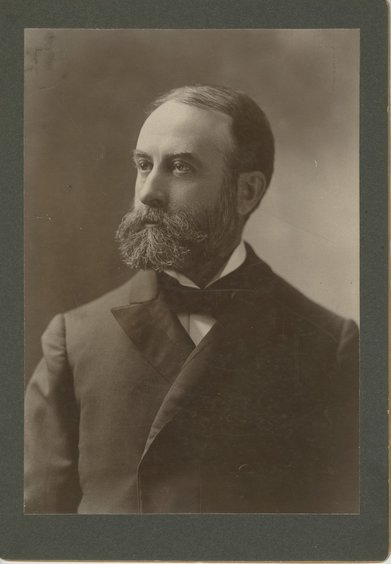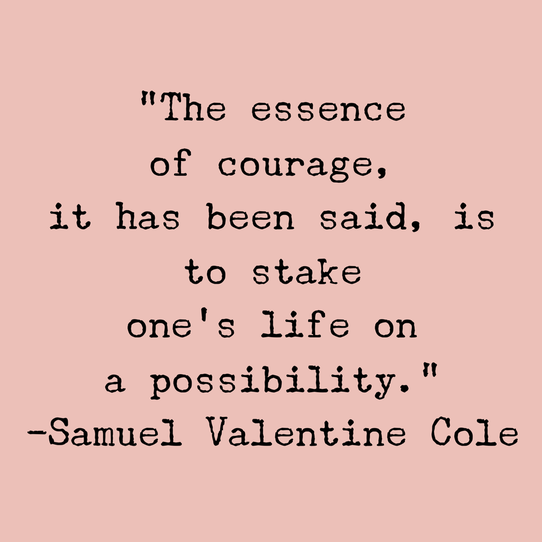|
The title of this article is not mine, but rather the title and main idea of a book by Reverend Dr. Samuel Valentine Cole, who was the first president of Wheaton College in Massachusetts. This book has had such an impact on me that it would be selfish to not try to expose others to the literary masterpiece.
I was first introduced to Cole's work when I heard one of his poems quoted in a sermon on the radio. Captivated by the lyric from "Hammer an Anvil", that poem became the foundation for my song, "The Word Will Stand" (listen here). Through researching to learn more about the author of the poem that inspired me so, I found "The Life That Counts", which was published in 1905. I strongly believe this 124-page book should be required reading in every school in this country, and beyond. It was the title, which speaks to my personal aspiration, and Cole's eloquent language that initially compelled me. But, very early in my reading, I was captivated by the genius of the content and the purposefulness of the message. Reminiscent of the writings of C.S. Lewis, the lessons in "The Life That Counts" are most certainly biblical, but they are also profoundly philosophical. It is difficult to assess how much praise should be awarded a man for such an accomplishment as "The Life That Counts", since reason suggests there is much more of the divine in its wisdom than of the natural. While it almost feels irreverent to me to pick apart the work in order to present some nuggets to you here, my goal is to summarize this inspired book in such a way that encourages others to read it.
Introduction and Chapter One
In the Introduction, Cole wastes no time getting to his assertions on which virtues constitute a meaningful life. He explains that his book was born out of an address to young people, meant to encourage them to aspire to "useful living". Speaking of his words, he says, "If in their printed form they should prove helpful in any way to other lives, the book will have achieved its aim.” Indeed, for me, it has. Couldn't we all use a lesson in "useful living"? I think so, regardless of how useful or not we may already feel. The first chapter, entitled “Burning Lamps and Coals of Fire”, is an exposition on zeal being more useful than talent. The pervading analogy in the chapter is the concept of amperage (which is the amount of electricity used) versus voltage (which is the intensity of electricity expended). My favorite quote from this chapter is: "We frequently think we need more truth, when what we really do need is more earnestness in using the truth we already have." (p. 9) With these words I am convicted to have more conviction, to be more zealous about the things I know to be true in this life. Chapters Two through Eight: The "Faces Of" Chapters After chapter one, the next seven chapters employ four cleverly built metaphors, based on the figures from Ezekiel's vision described in Ezekiel 1:10: "As for the likeness of their faces, they four had the face of a man, and the face of a lion, on the right side: and they four had the face of an ox on the left side; they four also had the face of an eagle." Chapter Two: "The Face of a Man" is an exploration of our humanity with an emphasis on the virtue of Sympathy. I think the theme of this chapter is summed up best by the following quote: "I mean that our humanity, if it is normal and the essential thing has not been squeezed out of it by selfish living, will transcend the bonds of kinship, of friendship, of patriotism, even of race, till one is able to say, "Nothing which concerns a human being is foreign to me."" (p. 19) Cole gives three direct maxims in the chapter, which he summarizes as: 1.) Mingle with people; 2.) Do something for others; 3.) Keep a lively sense of gratitude in your heart. Chapters Three and Four: The two chapters titled "The Face of a Lion" center around the theme of courage. The following quotes contain so much truth in just a few words. These gems of wisdom challenge us all. "What, then, is courage which we need so much, but possess so little? Courage is the willingness to endure pain for the sake of some end in view." (p. 34) "The object of life is not to find a pleasant road, but to reach a worthy goal, whatever the road." (p. 39) "The essence of courage, it has been said, is to stake one's life on a possibility." (p. 41)
Chapters Five and Six:
In the two chapters which deal with "The Face of an Ox", Cole extols the virtues of patience and perseverance. There is somewhat of an imploring tone to this dissertation on the importance of hard work. It is in these chapters that I found perhaps the most valuable insight for our present culture as a whole. The following two quotes are examples of that insight. "All real work is an honor to the person who does it. And by real work I mean work that is worth doing because it really benefits somebody. It makes no difference whether the implement used be a pen or pickaxe, hammer or hoe, needle or broom. If the thing is worth while, then the work is real work." (p. 66) "The real pauper is the man who will not work when he has the ability to work; he is the man who takes more from the world than he is willing to give back to the world; the balance in life's account stands against him." (p. 68) Chapters Seven and Eight: The two chapters titled "The Face of an Eagle" deal mainly with man's aspiration, with a focus on the benefits of solitude and meditation in reaching one's goals. "And, in the case of meditation, the worst of it is that we are losing not only the art but the desire. We prefer to take a thing for granted rather than sit down and think it out. We doom ourselves in this way to a mental and spiritual poverty. We must recover the desire and the art of deriving satisfaction and enjoyment from our own minds. Better is some thought of our own- a thought we have made a friend of- than a legion of thoughts which belong to other people and afford us only a bowing acquaintance." (p. 91) What profound wisdom! And to think, this was written at the beginning of the twentieth century. What would Cole say in this day about our inability to occupy ourselves with our own thoughts? Cole writes, "The life which does not aspire beyond the line of material things is poverty-stricken indeed. Are we not here to see the beautiful world, and to think God's thoughts after him, and to feel the workings of love in our hearts, and to do what is noble and kind? Have the stars and the trees and the rivers and the hills no message for us? Do we find nothing of interest in the creations of art, in literature, in history, in the lives of heroic men? Do the appeals of patriotism and philanthropy fall dead in our ears? Surely, we hope not." (p 92) The second of these two chapters gives the most direct advice. Here, Cole passionately pleads the case for the importance of reading, the appreciation of nature, and of cultivating the "companionship of God". "When one cultivates his sense of God, he soon finds the commonplace things of earth taking on for him the glory of heaven." (p. 108) The Last Chapter Titled "Losing and Finding", chapter nine is both a brilliant summary of and conclusion to the book. The main theme here is "disinterestedness". While at first glance the word seems like a negative virtue, Cole elaborates that disinterestedness in a life that counts means the lack of selfish interest. Cole provides us with solid instruction for having the proper view of both money and glory, and he saves for the very end a singular word to explain the meaning of a life that counts. "The life of earnest and disinterested service, that finds its joy in its work, is what Tennyson describes in some memorable lines as independent of perishable human praise; he sums up, indeed, in the one word "Virtue" what we have been calling the life that counts: "Glory of warrior, glory of orator, glory of song, Paid with a breath flying by to be lost on an endless sea; Glory of Virtue, to fight, to struggle, to right the wrong- Nay, but she aimed not at glory, no lover of glory she" Give her the glory of going on, and still to be."" (p. 124)
I hope I have been able to successfully convey my appreciation and admiration of "The Life That Counts" by Samuel Valentine Cole. From my online research, I am surprised by the narrow reach the book appears to have. Hopefully I am wrong and the impact is far greater than the number of "search hits" reveals. Regardless, Cole's book means a great deal to me, and I want to apply it's lessons in a pursuit toward more "useful living". Perhaps this article will give the book at least a small fraction of the exposure I feel it deserves and others will be inspired to strive toward a more meaningful existence as well.
Disclaimer: I am participating in the Amazon Services LLC Associates Program, an affiliate advertising program designed to provide a means for me to earn fees by linking to Amazon.com and affiliated sites.
0 Comments
Leave a Reply. |
About the BlogThank you for visiting my blog. I share devotional articles and musings about life, parenting, and the writing journey, as well as important news about my books. I hope you find something of interest here! Click below to sign up for my email newsletter, which includes links to my latest blog posts. Thank you!
Categories
All
Archives
August 2023
|






 RSS Feed
RSS Feed